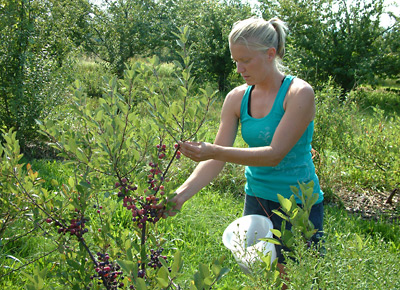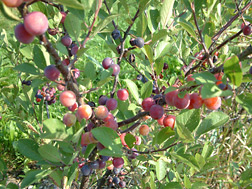Beach plum jam, anyone? Cornell develops line of crop plants away from the dunes to make sure you get your fill
By Krishna Ramanujan

It's harvest time at Cornell Orchards, and beach plums (Prunus maritima), commonly found on coastal dunes, are one of the newest fruits being harvested this year, thanks to an ambitious Cornell project to turn the unusual plant into a crop. That's because beach plum jam is in high demand, but finding enough fruit to make it has been increasingly hard.
Planted five years ago at the Cornell Orchards, the beach plum trees produced their first sizable crop this year, says Rebecca Harbut, a graduate student in horticulture. The 1,000-odd plants, 2- to 4-feet tall, are now ripe with the purple, maroon and yellowish fruits, about the size of a plump cherry.
The seeds for these plants come from stands as far away as Kennebunk, Maine, and Cape May, N.J., making them of Northeast origin and part of a provenance collection, seeds collected from defined geographic areas across the native range. The plants also grow well in New York with little input and make good fruit crops.
"This is probably the largest beach plum orchard anywhere and certainly the most diverse," said Tom Whitlow, associate professor of horticulture who heads the Cornell Beach Plum Project.

He added that there is a thriving cottage industry for jams made from local beach plums. But the fruits are increasingly inaccessible due to small stands, limited access to lands where they grow and government restrictions against "poaching" the fruits.
"A cooperative extension study a few years back indicated that demand [for beach plum jam] far exceeded supply, so to meet demand, provide a value-added product for small farmers and have a low-input, sustainable crop of beach plums was a natural," said Whitlow.
In late August and early September, students were out in the orchards picking the fruits. Whitlow and his graduate students make jams and syrup with Cornell food scientists at the processing plant at the New York State Agricultural Experiment Station in Geneva, N.Y. They then sell the products at the Cornell Orchard Store.
"Even if you live on Cape Cod where the plants are native, beach plum condiments are a gourmet treat," said Whitlow. Last year, he distributed puree to several Ithaca area restaurants, which immediately incorporated the fruit into dessert menus and into sauce for grilled duck.
This year Whitlow and one of the project's leaders, Rick Uva, a former Cornell graduate student who studied beach plums for his doctoral project and currently raises specialty fruits at his Maryland orchard, are selecting the most desirable plants with the highest quality fruit. Their buds will be grafted to seedling rootstocks to propagate these elite specimens for next year and to develop superior cultivars that eventually will be marketed to farmers.
The beach plum project includes a partnership of many farms in the Northeast, numerous Cornell departments, the University of Massachusetts and Rutgers University.
Media Contact
Get Cornell news delivered right to your inbox.
Subscribe